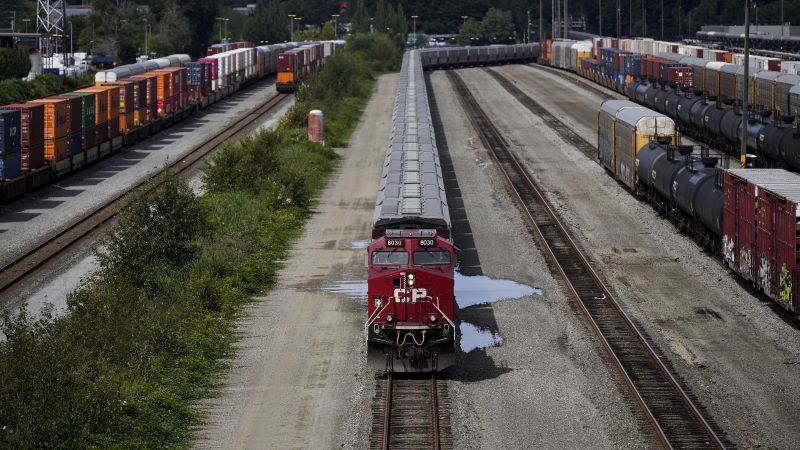Canada’s two major freight railroads, Canadian National (CN) and Canadian Pacific Kansas City Southern (CPKC), have shut down operations, locking out 9,000 members of the Teamsters union who operate the trains. This could disrupt operations in a number of US industries, such as agriculture, autos, home building, and energy, as a significant portion of the freight handled by the railroads crosses the US-Canadian border. The potential impact on both the Canadian and US economies is significant, as many industries rely on the free movement of goods across the border for their efficient operations.
The shutdown highlights the close economic ties between the US and Canada, with many industries dependent on the railroads for the transportation of goods. For example, US auto plants could face temporary shutdowns if they are unable to receive necessary parts from Canadian plants. Similarly, US farmers might experience shortages of fertilizer, and water treatment plants near the Canadian border could run out of essential supplies. This is the first time that both major Canadian railroads have shut down simultaneously due to a labor dispute, showcasing the severity of the situation.
The Teamsters union has been seeking a contract that both sides can agree on, citing concerns over reduced rest time and increased safety risks in the railroads’ demands. However, the railroads argue that their proposed changes would not compromise safety and comply with Canadian regulations. Both companies have called on the government to intervene and refer the dispute to binding arbitration, but the government has thus far refused. The chambers of commerce in both the US and Canada have also urged the Canadian government to take action to prevent further disruptions to the railroads.
Economists warn of the significant economic impact of the rail shutdown, as there is not enough truck capacity to handle the freight normally carried by the railroads. A three-day strike could result in $300 million of economic damage, while a seven-day strike could cause losses exceeding $1 billion. A shutdown of only a few days could still cause disruptions and take weeks to unwind the resulting problems. Both railroads have stopped shipments of hazardous materials to prevent potential issues in the event of a work stoppage.
Railroad spokespersons emphasized the need for a safe and secure shutdown due to the risk of a union strike with only 72 hours’ notice required by Canadian law. Unlike in the US, Canada does not have railroad labor laws that would allow the Prime Minister to block a strike or lockout. The Canadian Labor Minister has met with the union and management negotiators in an attempt to reach a deal, but the government has so far rejected binding arbitration as a solution. The ongoing dispute underscores the challenges faced by both the railroads and the government in resolving the situation and minimizing its impact on the economy.


